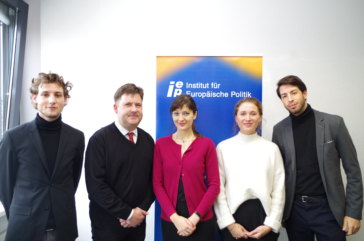Ninth Ukraine Breakfast Debate: “Attraction or Aversion? The Image of the European Union in Ukraine’s South and East” with Dr. Kateryna Zarembo from the New Europe Center (Kyiv)

On numerous political issues, public opinion in Ukraine is largely divided along regional lines and the question of European integration is no exception. Therefore, it was a great pleasure to welcome experts from both Ukraine and Germany to share their observations within our 9th Ukraine Breakfast Debate on November 27th, devoted to the topic “Attraction or Aversion? The Image of the European Union in Ukraine’s South and East”. Dr. Kateryna Zarembo from the Kyiv-based think tank, New Europe Center elaborated on the results of her studies on the public perception of EU integration in three Ukrainian cities: Odessa, Kherson and Kharkiv. Subsequently, Wilfried Jilge, associate fellow at the Robert Bosch Center for Central and Eastern Europe, Russia, and Central Asia at the German Council on Foreign Relations (DGAP) shared his insights on the subject. The question is currently relevant in the light of the newly imposed martial law applied to the regions addressed in the studies, as well due to the increasing number of attacks on civil society activists in the two regions.
There are strong differences of opinion in Ukraine’s regions with regard to the EU rapprochement process in Ukraine, claimed Dr. Zarembo. This relatively negative attitude of Southern and Eastern Ukrainian citizens can be on the one hand explained by the difficult geopolitical and security situation of the country at present. Furthermore, the areas in question are traditionally characterised by strong regional as well as city identities, which have lately fused with a strong “front identity” due to the current security threats derived from the proximity to Russia, Crimea and Transnistria. Thanks to these strong identity-forming factors, citizens of the border oblasts appear to be undecided both in the question of EU integration and, what is more, the upcoming elections in 2019. This uncertainty or “the phenomenon of silence”, as Zarembo puts it, has become increasingly typical for the regions in question as well as for internally displaced persons. According to Zarembo, this sceptical neutrality has been further aggravated by the negative public perception on the work of the central government, which is often associated with the European Union. As seen in some EU member states, project achievements supported or even fully implemented by EU agencies on the local level remain often times unrecognised by the residents of the region and are instead claimed by local elites. A lacking communication of the European Union on the the reforms related to the Association Agreement and its values & principles in general is the key problem within the whole debate, argues Kateryna Zarembo.
As for Wilfried Jilge, corruption on the municipal level, impunity and breaches of the rule of law remain among the main factors threatening the Europeanisation process and hence jeopardise the image of the EU in general. In the light of these observations, the conditions for the success of the decentralisation project appear extremely complex. The most crucial and at the same time challenging tasks to be undertaken by EU authorities have become clear towards the end of our breakfast debate: first, a comprehensive communication tool should be implemented in order to communicate the potentials and successes of the EU integration process in the respective local context. Second, the close monitoring of anti-corruption measures should be given priority in the long term.
The Ukraine Breakfast Debates take place within the framework of the Project “Platform for Analytics and Intercultural Communication” (PAIC) and are designed as Ukraine expert talks on topical and relevant issues, which are discussed with our guests over croissants and coffee. The project “Platform for Analytics and Intercultural Communication” (PAIC) aims at supporting the Ukrainian think tank landscape as well as fostering the exchange between German and Ukrainian research institutions. The project is implemented by the Institute for European Politics (IEP, Berlin) in cooperation the Ilko Kucheriv Democratic Initiatives Foundation (DIF, Kyiv) and the think tank development and research initiative „think twice UA“ (Kyiv) and with the kind support of the Federal Foreign Office.


